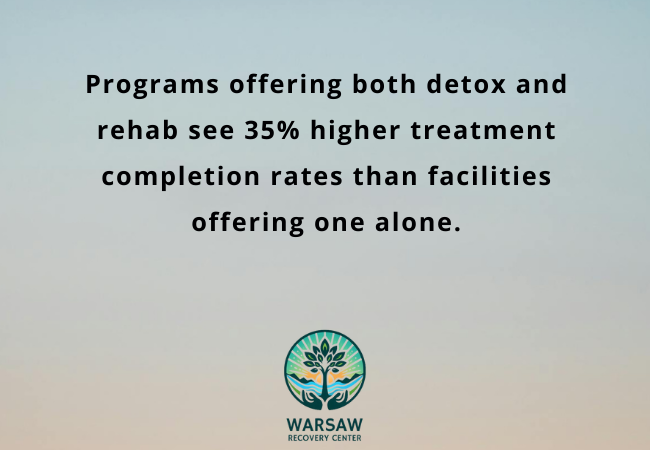Choosing the right inpatient treatment path is a critical step in the journey to recovery. For individuals and families exploring options in Substance Abuse Treatment in Virginia, understanding the difference between rehabilitative and stabilization-focused inpatient programs can clarify the direction of care that best suits their needs.
At Warsaw Recovery, we believe that personalized care starts with the right framework. Whether you’re seeking medical detox in Virginia or long-term recovery support through our residential treatment program, we help guide clients toward the program that best aligns with their goals, history, and health.
What Is a Stabilization-Focused Inpatient Program?
A stabilization-focused program is designed to provide short-term, intensive support for individuals in acute crisis—typically during the earliest stages of withdrawal, overdose risk, or psychiatric decompensation.
Key Characteristics:
- Duration: Often 3 to 10 days
- Primary Goals: Medical safety, psychiatric stabilization, withdrawal management
- Typical Services:
- 24/7 medical monitoring
- Medication-assisted detox
- Psychiatric evaluation and medication management
- Crisis intervention
- Who It’s For: Individuals in urgent need of medical or psychological stabilization before entering longer-term rehab or therapy
Example at Warsaw Recovery:
Clients entering our Medical Detox Program in Virginia for substances like alcohol, benzodiazepines, or methamphetamine typically begin in a stabilization phase. Here, our team ensures a safe detox process, manages withdrawal symptoms, and prevents complications like seizures, psychosis, or cardiac events.
What Is a Rehabilitative Inpatient Program?
A rehabilitative program focuses on the longer-term work of recovery—addressing the root causes of addiction, building coping strategies, and preparing for life beyond substance use.
Key Characteristics:
- Duration: Typically 30 to 90 days (or longer if needed)
- Primary Goals: Psychological healing, behavioral change, life skill development
- Typical Services:
- Individual and group therapy
- Trauma-informed care
- Relapse prevention training
- Family therapy and aftercare planning
- Who It’s For: Individuals who are medically stable and ready to engage in deeper therapeutic work
Example at Warsaw Recovery:
After completing detox, many of our clients transition into our residential treatment program in Virginia. This is where intensive rehabilitation takes place, particularly for those seeking Alcohol Addiction Treatment, Benzodiazepine Addiction Treatment, or Methamphetamine Addiction Treatment in Virginia.
How to Decide Which One You Need
Making the right choice starts with understanding where you are in your recovery journey.
You May Need Stabilization-Focused Care If:
- You’re experiencing acute withdrawal from alcohol, benzos, or opioids
- You have a dual diagnosis and are in psychiatric crisis
- You’ve recently overdosed or had a medical complication
- You’re unable to function safely without 24/7 supervision
You May Need Rehabilitative Inpatient Care If:
- You’ve already completed detox or are medically stable
- You’re struggling with long-term relapse patterns
- You’re dealing with unresolved trauma, depression, or anxiety
- You need help learning sober coping skills, repairing relationships, or rebuilding daily structure
Why the Distinction Matters
Some clients mistakenly believe inpatient rehab is only about detox or medication. In truth, stabilization is only the beginning. Long-term recovery is built in rehabilitation—where emotional wounds are addressed, behavior is reshaped, and life planning begins.
Jumping into rehab without proper stabilization can be dangerous. Conversely, leaving treatment after detox without entering rehab increases the risk of relapse, overdose, or psychiatric decompensation.
At Warsaw Recovery, we guide each client through both stages as needed—ensuring that care doesn’t stop at stability but evolves toward sustained change.
The Warsaw Recovery Continuum of Care
We offer a full spectrum of inpatient care to meet you wherever you are in your recovery journey.
Phase 1: Medical Stabilization
- Offered through our Medical Detox Program in Virginia
- Addresses urgent health risks related to substance use
- Particularly important for alcohol, methamphetamine, and benzodiazepine detox
Phase 2: Residential Rehabilitation
- Delivered through our Inpatient Treatment Programs in Virginia
- Focuses on clinical therapy, relapse prevention, and aftercare
- Ideal for those seeking long-term healing and a deeper reset
Case Study: Bridging Stabilization and Rehabilitation
Client Profile:
- 38-year-old male
- Long-term alcohol and benzo use
- History of panic attacks and insomnia
- Multiple failed outpatient attempts
Treatment Journey at Warsaw Recovery:
- Day 1-7: Admitted to stabilization for monitored detox and psychiatric support
- Day 8-30: Transitioned into residential care with trauma therapy and sleep re-regulation
- Post-30 Days: Discharged to an Intensive Outpatient Program (IOP) with continued medication management and family involvement
Outcome: 9 months sober, employed, and reintegrated with family support

What Happens If You Only Do One?
Stabilization Without Rehab:
- May resolve immediate danger, but doesn’t address long-term behavioral patterns
- Often leads to revolving-door detox admissions and higher relapse rates
Rehab Without Proper Stabilization:
- Risk of leaving early due to unmanaged withdrawal
- Difficulty engaging in therapy or group sessions
- Potential for medical complications during psychological treatment
Family Insight: Helping Loved Ones Choose Wisely
Families often struggle with understanding what their loved one needs most. At Warsaw Recovery, we educate and support families in making informed decisions by offering:
- Pre-admission assessments to determine clinical fit
- Family therapy and updates throughout the inpatient process
- Aftercare planning that includes family roles and boundaries
When families understand the difference between stabilization and rehabilitation, they become powerful allies in recovery—not unintentional obstacles.
How We Support a Seamless Transition
At Warsaw Recovery, our care is not fragmented. We support every client through a unified, step-down process:
- From detox to residential rehab
- From rehab to outpatient programs
- From inpatient to community re-entry
Our case managers and clinical staff meet regularly to coordinate transitions, ensuring that no one falls through the cracks during a vulnerable time.
Why Choose Warsaw Recovery?
As a premier Addiction Treatment Center in Virginia, Warsaw Recovery offers both stabilization and rehabilitation under one roof. Our integrated approach ensures continuity, safety, and compassion at every phase.
We specialize in:
- Alcohol Addiction Treatment Programs in Virginia
- Benzodiazepine Addiction Treatment in Virginia
- Methamphetamine Addiction Treatment in Virginia
- Dual Diagnosis and Psychiatric Support
- Family Involvement and Life Skills Coaching
Conclusion
Inpatient care isn’t one-size-fits-all. The choice between stabilization-focused care and rehabilitative care depends on your current needs, history, and goals.
At Warsaw Recovery, we’re here to walk with you—whether you’re just beginning detox or ready to dive into deep therapeutic work. Our residential treatment programs in Virginia are designed to provide structure, safety, and sustainable growth. Ready to take the first step? Call us today at 888.511.9480 to speak with a compassionate admissions coordinator who can help determine the best fit for you or your loved one.
FAQs on Stabilization vs. Rehabilitation in Inpatient Treatment
What’s the difference between detox and rehab?
Detox focuses on physical stabilization and safety. Rehab addresses the emotional, psychological, and behavioral changes needed for lasting recovery.
Do I need to go to rehab after detox?
Yes, in most cases. Detox gets you physically stable, but without rehab, you’re at high risk of relapse because the root causes of addiction aren’t addressed.
What if I only need rehab, not detox?
If you’re already medically stable or have detoxed elsewhere, you can begin rehab directly in our inpatient treatment program in Virginia after an initial assessment.
How long does each phase last?
Stabilization typically lasts 5–10 days. Rehabilitative treatment generally spans 30–90 days, depending on progress and personal goals.
Can I do both at Warsaw Recovery?
Absolutely. We provide a full continuum of care—from medical detox in Virginia to residential and outpatient treatment—all within our expert, integrated team.

